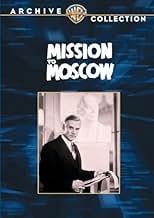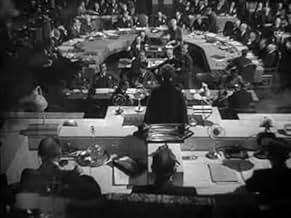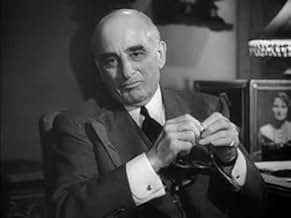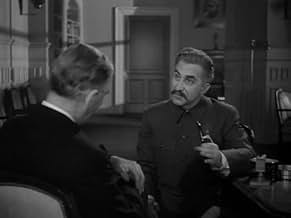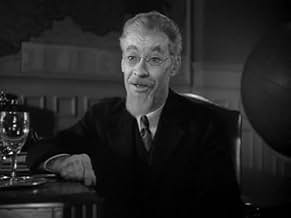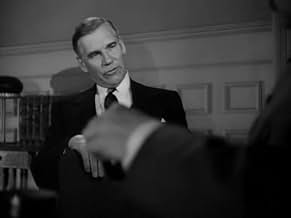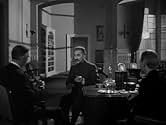NOTE IMDb
5,4/10
1,1 k
MA NOTE
En 1936, le président Roosevelt envoie son ami Joseph Davies comme ambassadeur en URSS où il rencontre les hautes sphères du pouvoir soviétique.En 1936, le président Roosevelt envoie son ami Joseph Davies comme ambassadeur en URSS où il rencontre les hautes sphères du pouvoir soviétique.En 1936, le président Roosevelt envoie son ami Joseph Davies comme ambassadeur en URSS où il rencontre les hautes sphères du pouvoir soviétique.
- Réalisation
- Scénario
- Casting principal
- Nommé pour 1 Oscar
- 2 victoires et 1 nomination au total
Avis à la une
This is one of the most astonishing films I've ever seen, not because of the content, but because of what it reveals about its subject. That would be one Joseph E. Davies, chosen by President Franklin Roosevelt before World War II as one of his personal ambassadors to the Soviet Union. FDR believed in the personal touch when dealing with other countries, so he would send his untrained cronies overseas for little fact-finding missions. Wendell Wilkie, for instance, went on one such mission at the height of the war. This film shows how well this tactic worked out.
This film records Davies' grand tour of Europe in the crucial 1937-1939 period. It opens with the real Davies giving a heartfelt (and very long) speech in which he describes himself as God-fearing and so forth (i.e., not a Communist). Then we segue to the actor playing Davies, Walter Huston, and follow his increasingly odd journey in which he talks to all the movers and shakers in Europe at the time (with the notable exception of Hitler, who refused to see him because he was "so busy," presumably planning his next invasion).
Now, this film was intended as a pure documentary of what Davies saw and learned. Davies himself obviously approved every single scene and every piece of dialog. That is what makes this film so astonishing.
Astonishing because Davies is revealed to be an absolute bumbler and inept fool who had no business touring Europe, much less representing the United States or having his opinions used to any purpose by the United States government. There are so many jaw-dropping moments that one almost begins to think this was a parody. But, alas, it was no parody, this is the actual sort of information that the US had about Europe on the eve of a war in which more than 20 million people died.
Davies laps up whatever fiction is served to him, and uses each morsel to regurgitate wrongheaded pronouncements about the state of the world. Virtually every conclusion he utters is based on information spoon-fed to him by people purposefully deceiving him. The truth about what was going on around him was discoverable, but he never bothers. As such, this film documents just how taken in Davies was by the Soviets, or put another way, how successful the Soviets were in snookering the naive American.
Let's give a few examples. Davies makes a big deal about "finding out" that Soviet factories were being sabotaged by opponents to Stalin (generically referred to as Trotskyites). Conveniently, these "saboteurs" were rounded up during his stay and put on trial. When some of his associates start questioning what is really going on, Davies piously opines, "We'd all just better wait for the trial so we can learn the real facts." Ha! Innocent abroad indeed. Indoctrinated in the US legal system, which was actually designed to get at the truth of a matter, Davies obviously had no idea what a Soviet show trial was all about. Obviously, as proved later, it was all an elaborate set-up. Soviet Marshal Mikhail Tukhachevsky had become too big for his britches, and Stalin wanted him dead, so he concocted the whole story about sabotage for Davies' (and everyone else's) benefit. Davies sits there, lapping up every lying word of it, unquestioning and practically inert intellectually.
At another moment, Davies' security people worry that their quarters may be bugged. They want to check the place out. But no, Davies will have none of it. "Let's give them the benefit of the doubt," he decides. One physically gasps when seeing this. Yes, this is the guy I want representing American interests abroad.
There are all sorts of propaganda moments that are delightful in their naiveté. The Soviets obviously put on a real show of their military might for the stupid American, with some particularly nice flourishes. A big deal is made in the film of the fact that there are women soldiers, women paratroopers, women this and that. This must have been to give an appearance of some kind of monolithic quality to Soviet forces. Yet students of the war will search in vain for the exploits of these hordes of Amazon warriors. It was all a show, kind of like those given at the Bolshoi. Hermann Goering bragged about doing the same thing to foreign visitors, it was a fairly common tactic among sophisticated diplomats. Somebody with a penetrating mind might have seen through such shenanigans, but that was asking too much of Davies.
Anyway, the film is such a farce that it's fascinating. Stalin looks so pleased with himself after feeding Davies more lies, lighting his pipe and smirking. Now we realize he wasn't happy because he had found such a fine fellow. Instead, he would have been smirking because he realized he had found the ultimate sucker. FDR himself caused the West endless grief at Yalta because he acted similarly to Davies, just "giving them the benefit of the doubt" and so forth. Stalin is said to have thought little of this film, and it is painfully clear why. He must have been embarrassed at the sheer ridiculousness of it, his choreographed charade immortalized on celluloid. It's possible that observing the sheer stupidity of the West may have contributed to his thinking he had more in common with the decidedly not-naive Hitler, leading to the Nazi-Soviet pact mentioned in the film (and explained away by Davies as Stalin just protecting his country, yeah, I'll buy that for $100, Alex).
Worth watching for a hoot, and to see how a reputation can be gutted by a person's own hand. I enjoyed it, but it also is agonizing seeing how much a fool it makes Davies look.
This film records Davies' grand tour of Europe in the crucial 1937-1939 period. It opens with the real Davies giving a heartfelt (and very long) speech in which he describes himself as God-fearing and so forth (i.e., not a Communist). Then we segue to the actor playing Davies, Walter Huston, and follow his increasingly odd journey in which he talks to all the movers and shakers in Europe at the time (with the notable exception of Hitler, who refused to see him because he was "so busy," presumably planning his next invasion).
Now, this film was intended as a pure documentary of what Davies saw and learned. Davies himself obviously approved every single scene and every piece of dialog. That is what makes this film so astonishing.
Astonishing because Davies is revealed to be an absolute bumbler and inept fool who had no business touring Europe, much less representing the United States or having his opinions used to any purpose by the United States government. There are so many jaw-dropping moments that one almost begins to think this was a parody. But, alas, it was no parody, this is the actual sort of information that the US had about Europe on the eve of a war in which more than 20 million people died.
Davies laps up whatever fiction is served to him, and uses each morsel to regurgitate wrongheaded pronouncements about the state of the world. Virtually every conclusion he utters is based on information spoon-fed to him by people purposefully deceiving him. The truth about what was going on around him was discoverable, but he never bothers. As such, this film documents just how taken in Davies was by the Soviets, or put another way, how successful the Soviets were in snookering the naive American.
Let's give a few examples. Davies makes a big deal about "finding out" that Soviet factories were being sabotaged by opponents to Stalin (generically referred to as Trotskyites). Conveniently, these "saboteurs" were rounded up during his stay and put on trial. When some of his associates start questioning what is really going on, Davies piously opines, "We'd all just better wait for the trial so we can learn the real facts." Ha! Innocent abroad indeed. Indoctrinated in the US legal system, which was actually designed to get at the truth of a matter, Davies obviously had no idea what a Soviet show trial was all about. Obviously, as proved later, it was all an elaborate set-up. Soviet Marshal Mikhail Tukhachevsky had become too big for his britches, and Stalin wanted him dead, so he concocted the whole story about sabotage for Davies' (and everyone else's) benefit. Davies sits there, lapping up every lying word of it, unquestioning and practically inert intellectually.
At another moment, Davies' security people worry that their quarters may be bugged. They want to check the place out. But no, Davies will have none of it. "Let's give them the benefit of the doubt," he decides. One physically gasps when seeing this. Yes, this is the guy I want representing American interests abroad.
There are all sorts of propaganda moments that are delightful in their naiveté. The Soviets obviously put on a real show of their military might for the stupid American, with some particularly nice flourishes. A big deal is made in the film of the fact that there are women soldiers, women paratroopers, women this and that. This must have been to give an appearance of some kind of monolithic quality to Soviet forces. Yet students of the war will search in vain for the exploits of these hordes of Amazon warriors. It was all a show, kind of like those given at the Bolshoi. Hermann Goering bragged about doing the same thing to foreign visitors, it was a fairly common tactic among sophisticated diplomats. Somebody with a penetrating mind might have seen through such shenanigans, but that was asking too much of Davies.
Anyway, the film is such a farce that it's fascinating. Stalin looks so pleased with himself after feeding Davies more lies, lighting his pipe and smirking. Now we realize he wasn't happy because he had found such a fine fellow. Instead, he would have been smirking because he realized he had found the ultimate sucker. FDR himself caused the West endless grief at Yalta because he acted similarly to Davies, just "giving them the benefit of the doubt" and so forth. Stalin is said to have thought little of this film, and it is painfully clear why. He must have been embarrassed at the sheer ridiculousness of it, his choreographed charade immortalized on celluloid. It's possible that observing the sheer stupidity of the West may have contributed to his thinking he had more in common with the decidedly not-naive Hitler, leading to the Nazi-Soviet pact mentioned in the film (and explained away by Davies as Stalin just protecting his country, yeah, I'll buy that for $100, Alex).
Worth watching for a hoot, and to see how a reputation can be gutted by a person's own hand. I enjoyed it, but it also is agonizing seeing how much a fool it makes Davies look.
Is that why he put forward this saccharine view of the Soviet Union? It was done sincerely and naively, was it?
I remember this -- the 1943 film version of Ambassador Davies' book -- as quite dull, in spite of its obvious historical and political interest, from when I last saw it a number of years ago. In the notes I took down at the time, I have the film labelled as "disturbing propaganda" and cite two choice quotations:
"At least, one European nation with no aggressive intentions is ready for whatever comes", exclaims Ambassador Davies (as portrayed by Walter Huston).
According to a Soviet minister, "The army is strengthened by the purge of its traitors."
(Stalin almost succeeded in strengthening his army right out of existence.)
Amazon lists a couple of scholarly titles specific to the Ambassador Davies controversy. Perhaps this film will whet your appetite for a little more background.
I remember this -- the 1943 film version of Ambassador Davies' book -- as quite dull, in spite of its obvious historical and political interest, from when I last saw it a number of years ago. In the notes I took down at the time, I have the film labelled as "disturbing propaganda" and cite two choice quotations:
"At least, one European nation with no aggressive intentions is ready for whatever comes", exclaims Ambassador Davies (as portrayed by Walter Huston).
According to a Soviet minister, "The army is strengthened by the purge of its traitors."
(Stalin almost succeeded in strengthening his army right out of existence.)
Amazon lists a couple of scholarly titles specific to the Ambassador Davies controversy. Perhaps this film will whet your appetite for a little more background.
I can understand the need for pro-allied propaganda when the outcome of the war was still uncertain, but this was pathetic. It's no surprise that Howard Koch was the screenwriter for this rather sorry effort to promote Soviet propaganda, or that he was later cited by the HUAC. Propaganda can be fun - try North Star or Days of Glory. This movie is not an effort to raise morale or promote a cohesive war effort. It's purpose appears to try to justify any and all the barbaric atrocities committed during the Stalin regime. Example: The show trials were interspersed with remarks by allied journalists approving of the same judicial perversion for which we condemned Germany at Nueremburg. We agreed with the Soviet position that Trotsky was responsible for undermining the good works of the Soviet. We blame ourselves for the Russo-German alliance. The fact that Russia absorbed half of Poland in payment isn't discussed. This movie actually claims it was strategic move to buy time. Davies (Walter Huston) spends the entire movie trying to convince us that the Soviet Union performed a miracle, 5 yrs at a time. Big business is portrayed as greedy capitalists anxious to do business with Germany and Japan in pursuit of the Almighty buck. Russia invaded Finland as an act of self defense etc, etc. The examples are too numerous to mention.
Michael Curtiz' direction, as usual, is exciting and flawless. It is this movies' only saving grace. The early scene when Davies arrives at the Hamburg train station was precious. There are Swastikas everywhere. In typical Curtiz style, shadow troops marched passed the camera. Mein Kampf was for sale everywhere. Pathetic deportees are on the platform - number tags on their chest - waiting for transport to the camps. Hitler Youth marching like toy soldiers. If you can put the politics aside (I couldn't) you can really enjoy the visuals.
But beware, there was a message to this madness.
Michael Curtiz' direction, as usual, is exciting and flawless. It is this movies' only saving grace. The early scene when Davies arrives at the Hamburg train station was precious. There are Swastikas everywhere. In typical Curtiz style, shadow troops marched passed the camera. Mein Kampf was for sale everywhere. Pathetic deportees are on the platform - number tags on their chest - waiting for transport to the camps. Hitler Youth marching like toy soldiers. If you can put the politics aside (I couldn't) you can really enjoy the visuals.
But beware, there was a message to this madness.
One of the most controversial films ever made, Mission To Moscow was not good for anyone's career who got involved with the making. Like Song Of Russia made over at MGM, Mission To Moscow was a film made specifically to improve Soviet-American relations in facing the common enemy they had.
The Soviet Union no matter how much the American Communist Party trumpeted their virtues, still had a real image problem in a lot of quarters due to the purges that Joseph Stalin conducted, due to the tremendous dislocation his five year plans created, due to the misery caused by the collectivization of agriculture and the systematic slaughter of Kulaks. Kulaks roughly translated could be anyone who owned a large estate to someone who might own a slightly bigger piece of land and maybe some farm animals. Stalin slaughtered thousands of them to force collectivization.
Our first ambassador to the Soviet Union was William C. Bullitt who was sent there in 1933. The Republican post World War I presidents did not diplomatically recognize the Soviet Union, Franklin Roosevelt's first foreign policy initiative was to extend recognition. Bullitt was a guy at first enthused, but then got very disillusioned by what he saw. He and FDR had a falling out and he left Moscow in 1936.
Joseph E. Davies was an industrialist and large Democratic contributor who did go back with FDR to the Wilson administration. He was appointed US Ambassador and after that became a cheerleader for the Soviets. As is shown in the film, Davies just blindly accepted every piece of propaganda handed to him. Films made in 1943 were not going to cast a critical light on the dark underside of Communist Russia.
Walter Huston dusts off his Sam Dodsworth persona to play Ambassador Davies. Ann Harding plays his dutiful wife and Eleanor Parker their daughter. Vladimir Sokoloff is President Kalinin, Gene Lockhart plays Prime Minister Molotov and Oscar Homolka plays Foreign Minister Litvinov all well known personalities of the day. In the Soviet Union like other countries Davies would have been required to present his credentials to the president and Russia did have a figurehead president who was a great deal less than Mission To Moscow makes him out.
At that time Joseph Stalin was only the Secretary of the Presidium of the Communist Party, but as such wielded the real power. The People's Republic of China adopted a similar set up that never changed with Mao Tse-tung as Party head and holding the real power while Mao lived.
Stalin is played by actor Manart Kippen and is only seen once as Davies is prepared to leave the Russian embassy. He's so shy and retiring the portrayal is so absolutely ludicrous that it leaves me laughing. But Davies sitting through the purge trials and accepting without question all the testimonies and forced confessions is also ludicrous.
After his time was up as Ambassador, Davies wrote the book on which this film was based and did go on a speaking tour promoting Russo-American cooperation. He was doing this on behalf of his friend and president FDR, but Davies had also become a real true believer in the 'miracle' that was Soviet Russia.
When the Cold War started three films became the targets of the House Un American Activities Committee, they were ripe targets that the conservative members were grateful for. The three films were The North Star from 20th Century Fox, Song Of Russia from MGM, and Mission To Moscow. None got more criticism than this one. Screenwriter Howard Koch who had won an Oscar this same year for Casablanca, earned a place on the blacklist because of Mission To Moscow. Whatever Koch's personal political convictions were, in this case all he did was translate to the screen what was in Davies's book.
Davies was held up to ridicule and in some measure deserved a bit of it because of Mission To Moscow. Time and the end of the Cold War have given us a proper perspective of the Russian contribution towards defeating the Nazis. In fact it was the lion's share in Europe. Policy decisions were made on the basis of keeping the Russians in the war before the Americans and British and respective allies got on the European continent with forces to make it a two front war, first in Italy and then in France. There was a justifiable fear that Stalin would make a separate peace with Hitler just as he signed the non-aggression pact with him before World War II started in 1939.
Of course the reports that Davies wrote off about the brutality of the Soviet Union were also true. The reactionaries had a field day with him, he was never taken seriously again. For that reason Mission To Moscow has not worn well either as history or entertainment.
The Soviet Union no matter how much the American Communist Party trumpeted their virtues, still had a real image problem in a lot of quarters due to the purges that Joseph Stalin conducted, due to the tremendous dislocation his five year plans created, due to the misery caused by the collectivization of agriculture and the systematic slaughter of Kulaks. Kulaks roughly translated could be anyone who owned a large estate to someone who might own a slightly bigger piece of land and maybe some farm animals. Stalin slaughtered thousands of them to force collectivization.
Our first ambassador to the Soviet Union was William C. Bullitt who was sent there in 1933. The Republican post World War I presidents did not diplomatically recognize the Soviet Union, Franklin Roosevelt's first foreign policy initiative was to extend recognition. Bullitt was a guy at first enthused, but then got very disillusioned by what he saw. He and FDR had a falling out and he left Moscow in 1936.
Joseph E. Davies was an industrialist and large Democratic contributor who did go back with FDR to the Wilson administration. He was appointed US Ambassador and after that became a cheerleader for the Soviets. As is shown in the film, Davies just blindly accepted every piece of propaganda handed to him. Films made in 1943 were not going to cast a critical light on the dark underside of Communist Russia.
Walter Huston dusts off his Sam Dodsworth persona to play Ambassador Davies. Ann Harding plays his dutiful wife and Eleanor Parker their daughter. Vladimir Sokoloff is President Kalinin, Gene Lockhart plays Prime Minister Molotov and Oscar Homolka plays Foreign Minister Litvinov all well known personalities of the day. In the Soviet Union like other countries Davies would have been required to present his credentials to the president and Russia did have a figurehead president who was a great deal less than Mission To Moscow makes him out.
At that time Joseph Stalin was only the Secretary of the Presidium of the Communist Party, but as such wielded the real power. The People's Republic of China adopted a similar set up that never changed with Mao Tse-tung as Party head and holding the real power while Mao lived.
Stalin is played by actor Manart Kippen and is only seen once as Davies is prepared to leave the Russian embassy. He's so shy and retiring the portrayal is so absolutely ludicrous that it leaves me laughing. But Davies sitting through the purge trials and accepting without question all the testimonies and forced confessions is also ludicrous.
After his time was up as Ambassador, Davies wrote the book on which this film was based and did go on a speaking tour promoting Russo-American cooperation. He was doing this on behalf of his friend and president FDR, but Davies had also become a real true believer in the 'miracle' that was Soviet Russia.
When the Cold War started three films became the targets of the House Un American Activities Committee, they were ripe targets that the conservative members were grateful for. The three films were The North Star from 20th Century Fox, Song Of Russia from MGM, and Mission To Moscow. None got more criticism than this one. Screenwriter Howard Koch who had won an Oscar this same year for Casablanca, earned a place on the blacklist because of Mission To Moscow. Whatever Koch's personal political convictions were, in this case all he did was translate to the screen what was in Davies's book.
Davies was held up to ridicule and in some measure deserved a bit of it because of Mission To Moscow. Time and the end of the Cold War have given us a proper perspective of the Russian contribution towards defeating the Nazis. In fact it was the lion's share in Europe. Policy decisions were made on the basis of keeping the Russians in the war before the Americans and British and respective allies got on the European continent with forces to make it a two front war, first in Italy and then in France. There was a justifiable fear that Stalin would make a separate peace with Hitler just as he signed the non-aggression pact with him before World War II started in 1939.
Of course the reports that Davies wrote off about the brutality of the Soviet Union were also true. The reactionaries had a field day with him, he was never taken seriously again. For that reason Mission To Moscow has not worn well either as history or entertainment.
Among the comments here I don't see much recognition of the fact that this propaganda film was released at the height of World War II, when the battle against Nazis was focused on Stalingrad, which arguably was the crucial battle of the war in Europe.
The context of this film cannot be ignored or minimized. Propaganda films are morale films, and the omissions and distortions which have been cited in Mission to Moscow are beside the point. Of course Stalin was a monster before, during and after World War II. Of course Joseph E. Davies was a naif, and a pompous one at that. Perhaps that's why he only lasted a year as ambassador.
On one hand, there is an absolutely ludicrous review here, praising Mission to Moscow as dispelling the terrible calumnies against the great Soviet achievements. On the other hand, there are those on the opposite side who, though far more accurate about Stalin and about how this film whitewashes his atrocities, seem so rabid in their responses, they fail to understand, or conveniently ignore, that propaganda films as documentaries are more or less bull, and that it's stupid to criticize a propaganda film because it's a propaganda film.
What is interesting about Mission to Moscow is not what it is trying to say or do, which requires little insight to divine, but how well it does it. This is a Hollywood "A" film enlisted in the service of propaganda. Top cast, direction and production values should have made for a very strong message to 1943 American audiences, whom the government wanted to think of the war against Germany as "We're all in this together."
As to the outrage of Stalin's show trials, I think that the sinister, menacing demeanor of one of the great Hollywood heavies Victor Francen as prosecutor Vyshinsky, versus the rather meek, contemplative demeanor of the defendants, suggests that the film knows what's going on, even if Davies doesn't.
Yes, the relentless pro-Soviet propaganda is a bit hard to take for those who sit smugly in the light of hindsight. But if you look at Mission to Moscow as document rather than documentary, you will gain an insight into the kind of public mindset called for by our government at a crucial moment in our history.
The context of this film cannot be ignored or minimized. Propaganda films are morale films, and the omissions and distortions which have been cited in Mission to Moscow are beside the point. Of course Stalin was a monster before, during and after World War II. Of course Joseph E. Davies was a naif, and a pompous one at that. Perhaps that's why he only lasted a year as ambassador.
On one hand, there is an absolutely ludicrous review here, praising Mission to Moscow as dispelling the terrible calumnies against the great Soviet achievements. On the other hand, there are those on the opposite side who, though far more accurate about Stalin and about how this film whitewashes his atrocities, seem so rabid in their responses, they fail to understand, or conveniently ignore, that propaganda films as documentaries are more or less bull, and that it's stupid to criticize a propaganda film because it's a propaganda film.
What is interesting about Mission to Moscow is not what it is trying to say or do, which requires little insight to divine, but how well it does it. This is a Hollywood "A" film enlisted in the service of propaganda. Top cast, direction and production values should have made for a very strong message to 1943 American audiences, whom the government wanted to think of the war against Germany as "We're all in this together."
As to the outrage of Stalin's show trials, I think that the sinister, menacing demeanor of one of the great Hollywood heavies Victor Francen as prosecutor Vyshinsky, versus the rather meek, contemplative demeanor of the defendants, suggests that the film knows what's going on, even if Davies doesn't.
Yes, the relentless pro-Soviet propaganda is a bit hard to take for those who sit smugly in the light of hindsight. But if you look at Mission to Moscow as document rather than documentary, you will gain an insight into the kind of public mindset called for by our government at a crucial moment in our history.
Le saviez-vous
- AnecdotesThis film was often mentioned during the 1947 House Un-American Activities Committee (HUAC) in its investigation of alleged Communist infiltration of the motion picture industry and was chiefly responsible for the blacklisting of screenwriter Howard Koch. Warner Bros. studio head Jack L. Warner defended the picture as being "made when our country was fighting for its existence, with Russia as one of our allies . . . The picture was made only to help a desperate war effort and not for posterity."
- GaffesAside from the issue of the fairness of the Moscow purge trials, or the truthfulness of the alleged confessions of the accused, the people shown standing trial together in the film in fact did not all stand trial at the same time. There were two such major show trials, one in 1937, the second in 1938, and the real life characters depicted in the film as being tried simultaneously were actually tried in separate groups at one of the two trials.
- Citations
Ambassador Joseph E. Davies: Mr. Stalin, I believe history will record you as a great builder for the benefit of mankind.
- Crédits fousOpens with a card reading: We have the honor to present the former Ambassador from the United States to the Soviet Union, the Honorable Joseph E. Davies, who will address you prior to the showing of the film made from his important book, "Mission to Moscow". In the picture itself, Mr. Walter Huston portrays Mr. Davies during those vital years encompassed in his now significant report to this nation. And now, Mr. Davies: [Mr. Davies gives a presentation on the actual events leading up to these events, and to this film.]
- ConnexionsFeatured in Hollywood on Trial (1976)
- Bandes originalesAmerica
(uncredited)
aka "My Country 'tis of Thee"
Music from "God Save the King"
Traditional
[In the score when Woodrow Wilson's bust is shown]
Meilleurs choix
Connectez-vous pour évaluer et suivre la liste de favoris afin de recevoir des recommandations personnalisées
- How long is Mission to Moscow?Alimenté par Alexa
Détails
- Date de sortie
- Pays d’origine
- Langues
- Aussi connu sous le nom de
- Mission to Moscow
- Lieux de tournage
- Lake Arrowhead, San Bernardino National Forest, Californie, États-Unis(Lake that Joe and family set off in a dingy named after his wife Marjorie)
- Société de production
- Voir plus de crédits d'entreprise sur IMDbPro
Box-office
- Budget
- 1 516 000 $US (estimé)
- Durée2 heures 4 minutes
- Couleur
- Rapport de forme
- 1.37 : 1
Contribuer à cette page
Suggérer une modification ou ajouter du contenu manquant

Lacune principale
By what name was Mission à Moscou (1943) officially released in India in English?
Répondre
